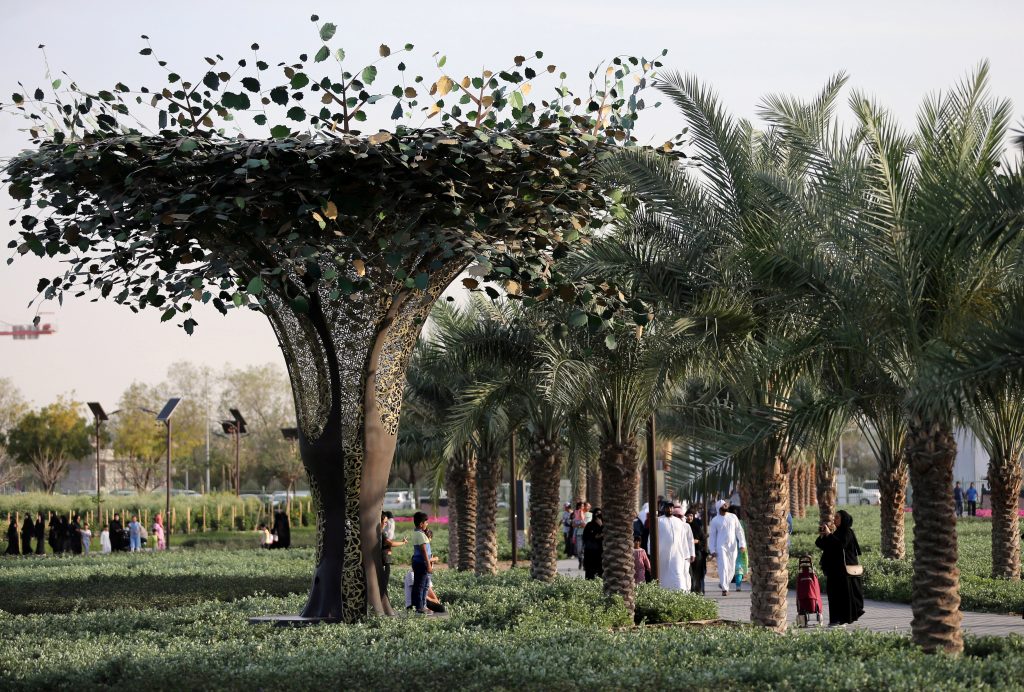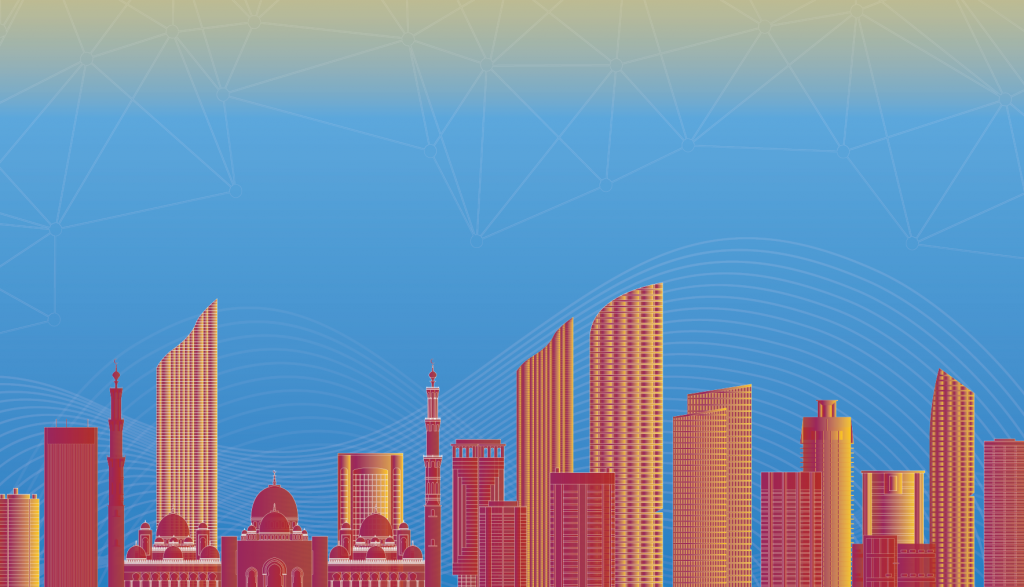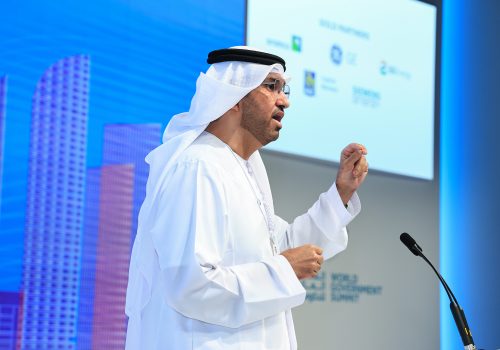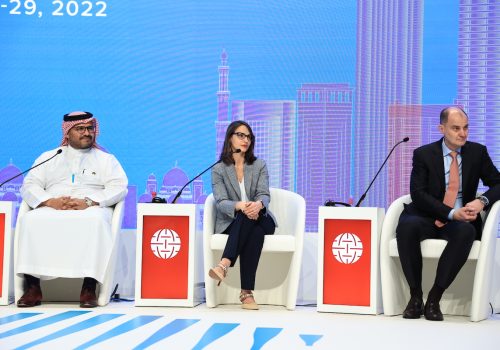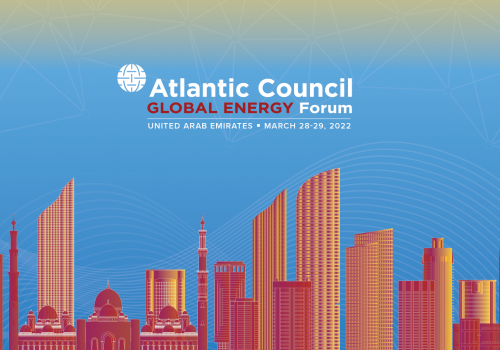Watch the full event
Event transcript
Uncorrected transcript: Check against delivery
Speakers
Musabbeh Al Kaabi
CEO, UAE Investments, Mubadala Investment Company
Moderator
Frederick Kempe
President and CEO, Atlantic Council
FREDERICK KEMPE: So this is one of my favorite aspects. And Musabbeh and I have done this several times over the years, and also recently in Houston. But ladies and gentlemen, so welcome back. The events this morning and afternoon have been really interesting. There are some themes and some threads running through the conversations, which we’ll talk about. We’ve heard from innovators launch initiatives, tackled obstacles to the energy transition head on, talked a lot about Ukraine, talked a lot about energy prices.
It’s now my honor to keep things moving with a conversation with Musabbeh Al Kaabi, the CEO of UAE Investments, Mubadala Investment Company.
This is a somewhat different position than you were in when we first started partnering with you at the Atlantic Council’s Global Energy Forum. I want to talk to you about that a bit. We’ll be speaking about UAE’s approach to investing in net zero. But I think we’re going to be talking about a lot more than that as well. And we’ll get into those issues.
But I think perhaps we could start by—Musabbeh, if you can talk to people a little bit about your greatly expanded responsibilities. You’re wearing a lot of hats. And I know one of them remains energy. But I wonder if you can also introduce yourself a bit to the audience, and particularly about your new responsibilities.
MUSABBEH AL KAABI: Thank you, Fred; truly a pleasure to be here at the Atlantic Council Energy Forum. Nice to see you guys come here all the way from the US at Expo, of course, and it’s a great opportunity to reconnect also with many people.
So as you rightly said, I manage now the UAE investments portfolio at Mubadala Investment Company. It’s a well-diversified portfolio with a mandate to, of course, manage the existing portfolio, but more importantly, more exciting is to accelerate the economic diversification efforts.
It’s interesting to see that Mubadala, of course, played a very critical role in fulfilling the economic-diversification vision for the UAE, in particular Abu Dhabi, for the last 15, 20 years. And we have also—of course, we’re going to continue on that mandate to diversify and accelerate the diversification of the UAE economy.
This time it’s going to be different, Fred. And I think there are other players in Abu Dhabi and in Dubai and the rest of the UAE that I think align behind one vision to accelerate that economic diversification.
So double-click on the portfolio. It’s a very diverse portfolio, spanning, as you mentioned, traditional energy, renewable energy through Masdar, and health care, life sciences, technology, communication. And, you know, you’re—when you look at these, I think these are the heart of what the region is trying to do is to establish and create the right ecosystem, a sustainable ecosystem, to ensure a proper diversification of the economy.
FREDERICK KEMPE: Terrific.
And can everyone hear all right, or do we need to adjust—everything’s fine.
Perhaps you can start by—you’ve been listening to some of the conversations today. There’s a world economy that one has some concerns about. There’s a regional economy where there seems to be quite a bit of optimism. First of all, in a macro sense, how are you looking at risks as you’re looking at the world? And how are you looking at the region?
MUSABBEH AL KAABI: Well, I think when you look at what’s happening at a macro level, it’s clear that there are a few emerging trends. One of them in particular that’s applicable to this region, or two in particular. One of them is energy transition and what this region is going to, I would say, embrace going forward, especially with the energy-transition agenda; and the other one, which was magnified during the pandemic, which is the supply chain.
The global supply chain is being challenged. We understand, we acknowledge, that we have a significant, you know, concentrated risk at certain parts of the world. And I think, in the long term, the midterm and long term, I think there will be more initiatives to diversify the supply chain going forward.
When I look at the region, I think there is a significant room for this region to play a growing role going forward. I think this region has played a significant role in ensuring the energy supply and the security of energy. Let me say, in the last 50, 60 years, we played a key role. We continue playing, as a region, a major role in fulfilling the future energy requirement and demand. So that’s, I think, undisputed. I think we will continue with that path.
But of course there is the energy transition, ESG, climate change. And the region has also, I see, a sense of optimism that the region will continue playing a role in the energy transition. It’s no coincidence that this region can generate a highly competitive energy. I think the—we all know that in the solar, when it comes to the solar generation, that to be able to generate solar power at around 1.2 [cents], 1.3 cents per kilowatt hour, that’s remarkable.
Mubadala started this journey back in 2006. At that time cost of solar was around 30 cents per kilowatt hour. So to drop it from 30 cents all the way to around one [cent], 1.2 [cents], 1.3 [cents], that’s remarkable, I think, progress.
So I have full confidence that this region will maintain its role as a reliable supplier of energy, be it traditional energy or be it in the hydrogen or solar or derivatives of the new renewables. So I think there is a sense, Fred, if I—there is a senses of optimism in the region, taking into account these, I think, megatrends. That’s happening. And I think the region will continue playing that role going forward with the energy—I mean, energy supplies to the rest of the world.
FREDERICK KEMPE: It’s so interesting for me, as you talk about a sense of optimism in the region, because there’s sort of two stories of the region. One of them is optimistic, and I want to talk to you a little bit about that. But also there’s still continued volatility; the Houthi attack in January, the drone. And, by the way, I think all of our hearts went out to you for that and our thoughts were with you through that period of time. And that doesn’t go away. There’s still that instability. Yet, on the other hand, you have the Abraham Accords offering hope.
And so I wonder if you can talk a little bit about the instability and what worries you, but on the other hand, what gives you hope. And perhaps when you talk about that, you can also talk about this very fascinating investment that you’ve made in Israel in the Tamar field.
MUSABBEH AL KAABI: Yeah, I think when it comes to the region, definitely I’m not a qualified individual to talk about geopolitical. But the region has seen different ups and downs for the last probably 50 years, but the UAE stay the course. We maintained our focus on economic development, economic diversification. We also shared an alternative model for the region, anchored around economic development, women empowerment, tolerance—the values that most of the people around, I think, in here believe in. So I have no concern about that model, and I think that model is the right model for the Middle East.
So based on these anchor, I would say, principles in our approach to the region, we have signed the Abrahamic Accord, of course. And we’re providing an alternative future for the region. And let me double-click on what that deal, I think, at least on the portfolio I manage. We signed a very interesting deal that is reflecting these new dynamics, but also at the heart of our strategy, because we have embraced renewable energy as an institution a long time ago. We embraced natural gas as a bridge fuel and as a transitional fuel. And we signed this deal in Israel to acquire 22 percent of Tamar field.
Tamar field, by the way, is very interesting field. It is a field that’s supplying the Israeli local market, that is supplying two other regional countries, and with an investment from the UAE. So it’s positioned as a unique, I would say, proposition; an alternative, hopefully, dynamics for the future. So that’s the type of—
FREDERICK KEMPE: And it’s supplying Jordan?
MUSABBEH AL KAABI: Supplying Jordan, Egypt, and Israel, and operated, by the way, by an American reliable operator.
FREDERICK KEMPE: And did you ever think, even five years ago, that this kind of investment was—
MUSABBEH AL KAABI: That was—
FREDERICK KEMPE:—possible?
MUSABBEH AL KAABI:—definitely unthinkable 10 years back. But it says, hopefully, that more collaboration in the region—reflecting more collaboration in the region. And I hope that we see more regional collaboration.
FREDERICK KEMPE: Yeah. And we at the Atlantic Council, working very closely with the Talpins Foundation, are really pushing forward the relationships, the interconnectivity, from the—what we call the normalization seven, the normalization countries.
Your boss made some news today right next door, Investopia, where Khaldoon Al Mubarak, who we’ve worked with very closely as well at the Atlantic Council, talked about putting a pause on investments in Russia. And I think he mentioned that 1 percent of the portfolio for Mubadala is Russia, which isn’t all that much. But when you have a large company like Mubadala, it’s still meaningful.
Maybe you can talk a little bit about that, what that means. But more largely, perhaps, what impact does this war, the situation, in your view, have on energy markets, on the economy? How are you looking at it?
MUSABBEH AL KAABI: Yeah. Well, Fred, I think we share, I think, concerns, of course, all of us, about what’s happening and the escalation in East Europe. That’s creating new dynamics globally. I mean, you have discussed in length this morning about the energy security. This agenda was not on the top when you talk about renewables, energy transition. But I think it’s—we’re revisiting this. It was definitely at the top in the agenda in the ’70s. But I think it’s emerging as one relevant topic when we deal with energy transition, when we deal with the world economy, of course.
But there is a bigger play as well here. It’s creating an interesting dynamic related to the potential, of course, excessive inflation that could lead to a European recession, that could also drag world economy downward. So that’s an area of concern that all of us need to carefully monitor.
I think it also puts some focus on the energy-transition agenda. And instead of being, I would say—let me put it that way. I think we need to be very pragmatic when it comes to the energy transition going forward, because it’s not only the energy transition. We need to make sure that it’s a smooth transition; it is transition that does not expose certain parts of the world economy to unnecessary liabilities. And we’ve seen it in Europe now.
So I think it will have, in the long term—in the short term a big implications on the inflation and how we’re going to deal with that inflation versus growth or negative growth. And on the midterm and long term, of course, it’s going to be the energy-transition agenda. And when you look at the renewable energy, it’s not in a better space than natural gas in Europe, because if you look at the solar panels, all of us know that we also in the supply chain, we’re heavily exposed to a certain part of that supply chain, to certain places. And I think we—that would take—
FREDERICK KEMPE: Just to translate that into my own language, about 80 percent in China in terms of solar panels.
MUSABBEH AL KAABI: But others also. I mean, look at—there are a few industrial gases. All of a sudden, we realize that certain gases 50 percent produced in East Europe, and in particular in Ukraine. So I think we need to carefully look at our supply chain when it comes to the technology, when it comes to the energy transition, and identify these bottlenecks, because any future disruption in the system might have even worse consequences on the ability for the world economy to pivot and go through a smoother energy transition.
FREDERICK KEMPE: So just mirroring back to you a little bit, what I think I’ve heard you say is that part of the impact of the war in Ukraine is more focus on supply chains. And then what impact do you think it will have on the energy transition? Is it a negative impact or is it a positive impact? Because it could cut both ways.
MUSABBEH AL KAABI: I think—I agree. I think at this time it would be difficult to draw a specific scenario. So you have the argument of, well, this crisis exposed energy transition. And it’s clear that the traditional energy would have a significant role in that transition going forward. So I think that would accelerate the renewable energy and the energy transition.
But on the other hand, Fred, you also need to acknowledge any future tension would also disrupt the energy-transition supply chain.
FREDERICK KEMPE: Yeah.
MUSABBEH AL KAABI: And that is going to be a very, I would say, interesting dynamics to see developing. And I think it could go both ways, Fred. Let’s see how it will evolve.
FREDERICK KEMPE: One of the things I definitely wanted to talk to you about before we have to break is decarbonization. We all know what a huge role the UAE is playing both as an advanced economy, major energy exporter. Mubadala plays such a huge role within all of this.
In your expanded responsibilities, are you looking at decarbonization any differently in the UAE? And then how is the UAE approaching the diversification of its economy in this net-zero world? Because it’s been quite interesting that you got way ahead of some other countries in this region in terms of diversification.
MUSABBEH AL KAABI: Yeah. Well, let me start with the overarching objective by the government. Already, the UAE was the first Middle Eastern country to set a very bold target when it comes to the carbon neutrality: 2050. I think that’s the target set by the government. So what does that mean? It means—you know, if you cascaded one or two levels down, it means decarbonization of many activities in the economy.
And I’ll give you a few examples. We already announced that Emirates Global Aluminium, one of the largest industrial activity outside oil and gas in the country, is going to go into that path. So we already set a target to fulfill—also to be part of that big overarching target.
So, yes, I see that the decarbonization is set by the government. I think it will cascade down to many activities. So it means—which means that we will need more than one solution. We need hydrogen. We need renewable energy. We need natural gas. We need carbon capture. We need a set of different solutions to be able to meet that target by 2050. But I’m optimistic hopefully that we will see more initiatives coming in the system very soon. So that’s in one hand. And I think the progress so far has been great, and I can see that there will be more progress on this front.
Now, when it comes to the economic diversification, you know, the UAE embraced this vision back in 2007. We have created sectors from nothing. And we’re very proud of what we achieved. Mubadala was spearheading many of these initiatives, including Masdar. So Masdar established in 2006, when many people, not only in the region but globally, were very skeptical about—
FREDERICK KEMPE: As part of Mubadala.
MUSABBEH AL KAABI: Part of Mubadala, 100 percent owned by Mubadala. At that time many people were skeptical about the potential of renewable energy going forward. And on top of that, an oil-exporter country like UAE to commit to the renewable, that was very bold step at that time, very progressive. And I think it comes with a very strong conviction.
That conviction is still translated to today. I think we still believe that the future will require collective efforts globally to address decarbonization agenda. And the UAE is going to host COP28 next year. That’s also a strong testament that the world believes in our commitment in the decarbonization, in the ESG, in the climate change. And hopefully we’ll hear more and more, I would say, forward-looking initiatives to ensure that there is a smooth and tangible energy transition going forward.
To go back to the economic diversification, it’s a wider scope. And we’re part of a bigger ecosystem. I see it already being translated into tangible initiatives. But also we see more coming up in the system. So we upgraded, of course, our view on what sectors do we need to bring to the region.
Of course, technology is a very wide spectrum, but technology is going to be part of the transformation, energy transition. And I’m very happy to see that Masdar is being recognized as the UAE champion for renewable energy, with very strong targets going forward. By the way, the National Oil Company is going to become our partner and TAQA will become also partner in Masdar.
So that’s great, I would say, signal that we translate our vision into reality. And hopefully Masdar will become the undisputed renewable-energy champion for the UAE, expanding its footprint globally. We’re already in North America, Europe, Asia, Middle East. And we’re going to see more and more steps in that direction.
Last but not least, but the one that—so we talked about technology energy transition. I think the other sector that we like as an institution is life science and health care. So that’s something we have, you know, upgraded in way forward. And hopefully we’ll see more partnerships, we’ll see more sustainable ecosystem being built in the country and in the region.
FREDERICK KEMPE: So last question—and we can be brief on this—is you’re talking about the areas for the future. You’re talking about the things you want to invest in going forward. Randy Bell knows that I’m a little bit obsessed about hydrogen. And I don’t know how many of you are old enough to remember or have watched reruns of the movie “The Graduate.” But Dustin Hoffman was told go into plastics, go into plastics. And for me right now, I think, you know, whatever might—hydrogen’s in my head.
But maybe it’s not in your head, although I know you’re doing a lot in hydrogen. What is the most exciting new area of energy for investment for you right now?
MUSABBEH AL KAABI: In general, I think we maintain our conviction, renewable. And there will be more on the renewable; hydrogen, as you mentioned. And hydrogen is very interesting, because there are, you know, maybe three, four types of different hydrogen. But we focus on two colors, green and blue. So when it comes to the blue, I think we are very strongly positioned to capitalize on the blue hydrogen. When it comes to green, we can produce the lowest-cost solar energy. And that means a lot when it comes to the green-hydrogen production.
So these are very exciting trends coming up. And I think hydrogen will address some of the inherited issues with renewable. And we just need a few more years, hopefully, and we will see it—
FREDERICK KEMPE: There’s not too much—not too much hype about it? It’s the real thing?
MUSABBEH AL KAABI: It is the real thing. And I keep also talking to my traditional-energy team. I said, historically you’ve been cold hydrocarbon. Let’s for a moment remove the carbon atom and keep the hydrogen and continue what you do. So hopefully, I think, it’s—there is an infrastructure already we can capitalize on with the natural-gas infrastructure globally. So I think there is a benefit from capitalizing on an existing infrastructure and pivoting to a lower-carbon environment.
FREDERICK KEMPE: This is wonderful. I think if you would look at our conversations over the years, we’ve learned along with you. You’ve taught us much about how to look at the future of energy. Congratulations on your expanded responsibilities; very excited to hear about the field in Israel; very excited to hear about the new plans for Masdar. Thank you for sharing so much with us today.
MUSABBEH AL KAABI: Thank you. Thanks a lot.
Watch the full event
Further reading
Mon, Mar 28, 2022
To prepare for the energy transition, policies must serve ‘real-world scenarios,’ says top UAE official
Global Energy Forum By
In all the world's challenges—the ongoing pandemic, inflation, and, most recently, the Russian invasion of Ukraine—energy plays a central role.
Mon, Mar 28, 2022
How will today’s energy crisis impact the global energy transition?
Global Energy Forum By
The move to clean energy is crucial, but solving today's energy crises will be also key.
Mon, Mar 28, 2022
Meet the global leaders powering the world’s energy transition
Global Energy Forum By
The return of pre-pandemic energy consumption, threats of cyberattacks on critical infrastructure, crises across Europe, and more have dampened hopes for a swift energy transition. But global energy leaders are no less determined.
Image: Solar panel trees are seen on the pathway at Dubai's Quranic Park in Dubai, UAE April 6, 2019. Picture taken April 6, 2019. REUTERS/Satish Kumar
